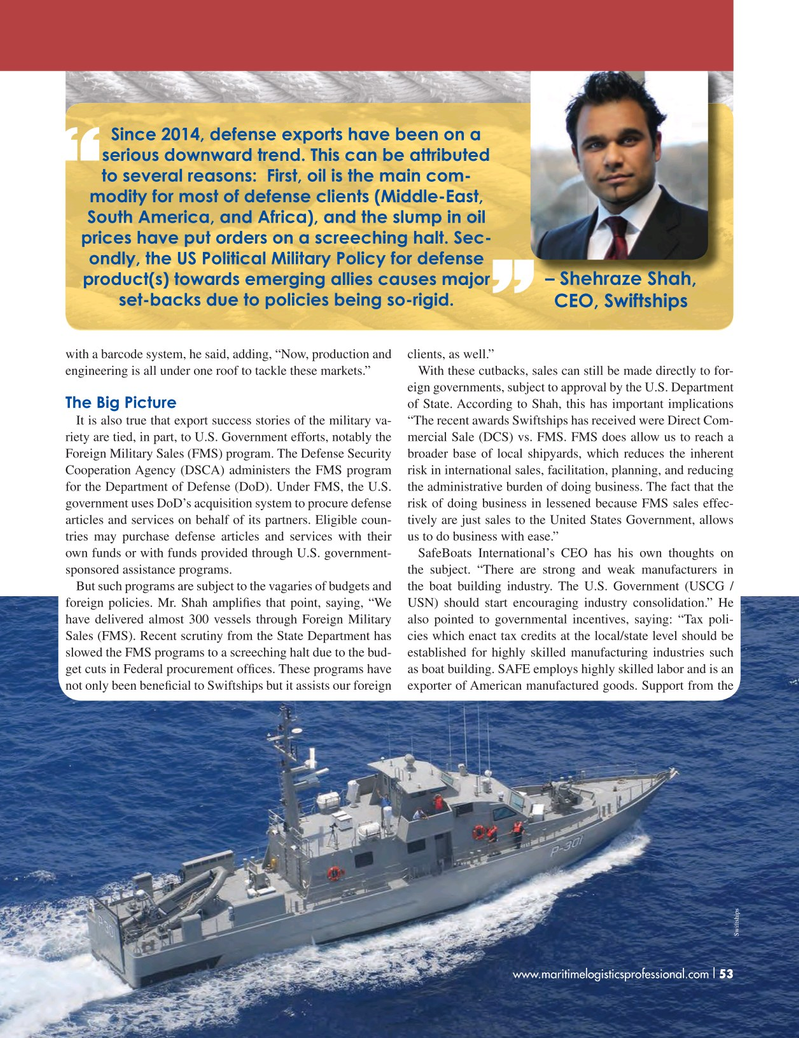
Page 53: of Maritime Logistics Professional Magazine (Q3 2016)
Shipbuilding, Repair & Maintenance
Read this page in Pdf, Flash or Html5 edition of Q3 2016 Maritime Logistics Professional Magazine
Since 2014, defense exports have been on a serious downward trend. This can be attributed to several reasons: First, oil is the main com- modity for most of defense clients (Middle-East,
South America, and Africa), and the slump in oil prices have put orders on a screeching halt. Sec- ondly, the US Political Military Policy for defense – Shehraze Shah, product(s) towards emerging allies causes major set-backs due to policies being so-rigid.
CEO, Swiftships with a barcode system, he said, adding, “Now, production and clients, as well.” engineering is all under one roof to tackle these markets.” With these cutbacks, sales can still be made directly to for- eign governments, subject to approval by the U.S. Department
The Big Picture of State. According to Shah, this has important implications
It is also true that export success stories of the military va- “The recent awards Swiftships has received were Direct Com- riety are tied, in part, to U.S. Government efforts, notably the mercial Sale (DCS) vs. FMS. FMS does allow us to reach a
Foreign Military Sales (FMS) program. The Defense Security broader base of local shipyards, which reduces the inherent
Cooperation Agency (DSCA) administers the FMS program risk in international sales, facilitation, planning, and reducing for the Department of Defense (DoD). Under FMS, the U.S. the administrative burden of doing business. The fact that the government uses DoD’s acquisition system to procure defense risk of doing business in lessened because FMS sales effec- articles and services on behalf of its partners. Eligible coun- tively are just sales to the United States Government, allows tries may purchase defense articles and services with their us to do business with ease.” own funds or with funds provided through U.S. government- SafeBoats International’s CEO has his own thoughts on sponsored assistance programs. the subject. “There are strong and weak manufacturers in
But such programs are subject to the vagaries of budgets and the boat building industry. The U.S. Government (USCG / foreign policies. Mr. Shah ampli? es that point, saying, “We USN) should start encouraging industry consolidation.” He have delivered almost 300 vessels through Foreign Military also pointed to governmental incentives, saying: “Tax poli-
Sales (FMS). Recent scrutiny from the State Department has cies which enact tax credits at the local/state level should be slowed the FMS programs to a screeching halt due to the bud- established for highly skilled manufacturing industries such get cuts in Federal procurement of? ces. These programs have as boat building. SAFE employs highly skilled labor and is an not only been bene? cial to Swiftships but it assists our foreign exporter of American manufactured goods. Support from the
Swiftships www.maritimelogisticsprofessional.com 53I 50-63 Q3 MP2016.indd 53 8/17/2016 10:27:43 AM

 52
52

 54
54
